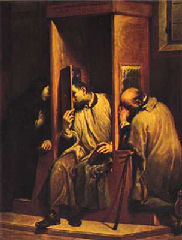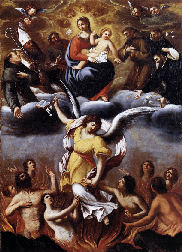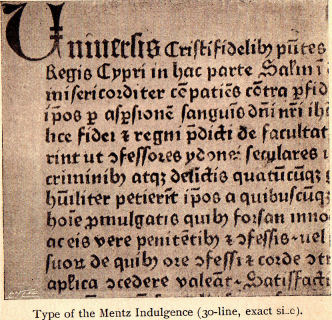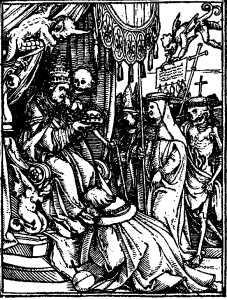Chapter 9: The Indulgence Trick
Pope Urban II offered a plenary indulgence to crusaders who completed their vows or died in the effort. Subsequent pontiffs launched crusades (sometimes targeted at Europeans) with the same offer. Indulgences were eventually extended to those who financed the crusades. Since indulgences were so integral to these important pontifical projects, they are worth considering in a little more detail.
Here is the theory in a nutshell:1. Baptized[1] Christians commit two levels of sin, mortal and venial. Anyone dying with an unforgiven mortal sin goes straight to hell without passing Go. If only venial sins are unremitted, a stint in purgatory is required to burn off the stain before the soul is admitted to heaven.
2. No one, not even Sr. Mary Immaculata, could say how long a period in purgatory would be required. It could be nanoseconds; it could be millennia or a unit of time incomprehensible to humans.

5. If the sins are not burned off, an industrial-strength cleanser must be used to remove the stain from the souls. Fortunately, Christ and the saints have built up a huge reserve of brownie points – called the Treasury[2] – that the pope can tap for the purpose of reducing the sentences in purgatory.

7. A plenary indulgence removes the entire penance; other indulgences have fixed periods – days, months, or years. Theologians are divided as to what becomes of “unused minutes.”
8. Some indulgences can now be applied to other people’s souls. Originally each indulgence was reserved for the person who earned it.
As theological issues go, this one is not particularly obscure. One aspect, however, poses a real stumper. For venial sins most priests prescribe a banal collection of “Our Fathers” and “Hail Marys” that can be completed within a few minutes of dismissal from the confessional. Surely no one would deny that most souls in purgatory are there due to failure to confess their sins rather than failure to complete such a trivial penance. So, the obvious question is this: when people who have earned plenary indulgences die with unconfessed sins, must they spend time in purgatory?
The Catholic Encyclopedia addresses the subject in this manner: “Least of all is an indulgence the purchase of a pardon that secures the buyer's salvation or releases the soul of another from Purgatory.”[3] On the other hand, a paragraph or two later it says, “An indulgence is valid both in the tribunal of the Church and in the tribunal of God. This means that it not only releases the penitent from his indebtedness to the Church or from the obligation of performing canonical penance, but also from the temporal punishment that he has incurred in the sight of God and that, without the indulgence, he would have to undergo in order to satisfy Divine justice.”Without guidance from experts like the Ursulines, who could say whether that combination of statements amounted to a yes or a no? Because indulgences were sometimes mentioned on the back of holy cards, the subject did arise in S’ter’s class. She solemnly warned us not to rely on them to save our sorry souls. Good advice.
The popes had a good reason not to clarify the nature of indulgences. If the faithful understood that indulgences only applied to venial sins that had already been conditionally absolved, then their perceived value would obviously be much diminished. In fact, they would scarcely be worth mentioning. This is certainly the position espoused on the website, “Catholic Answers,” which includes both an Imprimatur and a Nihil Obstat. “The definition of indulgences presupposes that forgiveness has already taken place: ‘An indulgence is a remission before God of the temporal punishment due to sins whose guilt has already been forgiven (Indulgentarium Doctrina,) [emphasis added by Catholic Answers]. Indulgences in no way forgive sins. They deal only with punishments left after sins have been forgiven.”[4] Basically, an indulgence and eighty-five cents will get you a senior coffee at participating McDonald’s.
In contrast, recall what the people listening to Pope Urban II remembered him offering:
Fulcher: “All who die by the way, whether by land or sea, or in battle against the pagans, shall have immediate remission of sins. This I grant them through the power of God with which I am invested.”
Robert: “Accordingly undertake this journey for the remission of your sins, with the assurance of imperishable glory of the kingdom of heaven.”
Gesta: “Great is your reward in heaven.”
Balderic: “Or empurpled with your own blood, you will have gained everlasting glory.”
One crusader was quoted as saying, “The hearts of the people were greatly moved by the generous terms of this indulgence, and many, on that account, were moved to take the cross.”[5] What are the chances that a million or more people could be persuaded to walk, ride, or even sail thousands of mile to the Holy Land, risk disease and starvation, and fight the Turks and Saracens just to avoid a few minutes on their knees mumbling “Pater Nosters” or “Ave Marias”?
Maybe Pope Urban II and subsequent pontiffs were actually as careful in their phrasing as The Catholic Encyclopedia was. A man hears what he wants to hear and disregards the rest. However, I seriously doubt that Adhemar and the other clerics accompanying the crusaders did much to disabuse their charges of the notion that heaven awaited them if they helped to defeat the Muslims. Nobody knows with certainty precisely what Pope Urban promised, but the message that filtered down to the great unwashed masses was that completion of a crusade was a ticket to paradise. Eamon Duffy made the point this way, “All over Europe popular opinion seized on the notion that by virtue of involvement in the Crusade a man’s sins were wiped away. Gradually the language of the popes about the Crusade dropped the early theological cautions and spoke of ‘full remission of sins.’ By the end of the twelfth century, theologians had begun to worry about this, and papal language returned to its earlier reticence.”[6]One can only guess how many smug Christian warriors remain in hell or purgatory crying out hoarsely, “But my indulgence …” as demons and devils apply acid, hot coals, and implements of torture to their most sensitive body parts. Not even Salvatore, who never showed a trace of scruples, was nervy enough to ask Sr. Mary Immaculata about this.
Here is one last interesting theoretical question: If an indulgence only works for sinners who die in a state of true contrition, and if only the pope has the ability to allow them admission to heaven without suffering a period of fiery punishment, why would anyone known by the titles of “Vicar of Christ,” “Holy Father,” and “His Holiness” deliberately decide to withhold this boon from them? What could possibly induce anyone with even an ounce of Christian charity to deny God’s repentant children immediate access to beatific vision?Indulgences are still available. Anyone can now earn a plenary indulgence in quite a few ways short of bringing down the walls of Jerusalem. For example, a specified number of visits to various locations in Rome will suffice, providing that one does it during a Jubilee Year (now officially called “Holy Year of Jubilee”). The next one is scheduled for 2025, but the popes can declare them whenever the Vatican’s tourist revenues needed a goosing.
An alternative is to take advantage of the “Porziuncola Indulgence,” available to those who visit the Porziuncola Chapel of the church of Santa Maria Degli Angeli just outside the walls of Assisi. Any year will do for this indulgence, but one must go on August 2, when respectable Italians are comparing their tans at the lido. The story goes that in 1217 St. Francis himself successfully lobbied Pope Honorius III to establish this indulgence.
[1] The purpose of baptism is to remove “original sin” inherited from Adam and Eve.
[2] The Catholic Encyclopedia describes this fund with these words: “The Church herself is not the absolute owner, but simply the administratrix, of the superabundant merits which that treasury contains. In applying them, she keeps in view both the design of God's mercy and the demands of God's justice. She therefore determines the amount of each concession, as well as the conditions which the penitent must fulfill if he would gain the indulgence.” Evidently it is inconceivable that this fund could run dry. Of course, in practice the “She” who “determines” is always a “he.” Op. cit., Vol. VII, p. 783.
[3] The Catholic Encyclopedia, op. cit., Vol. VII, p. 783
[5] Geoffrey Villehardouin, “The Conquest of Constantinople,” in Chronicles of the Crusades, Penguin Books, 1963, p. 29.
[6] Duffy, op.cit., p. 105.
 | |
 | |
Bankable Bar Bets
$ All crusaders were granted plenary indulgences just for participating.
$ Indulgences were later granted to those who financed papal projects and to individuals who completed various pilgrimages.
$ An indulgence removes some or all of the penance for venial sins that have already been forgiven.







